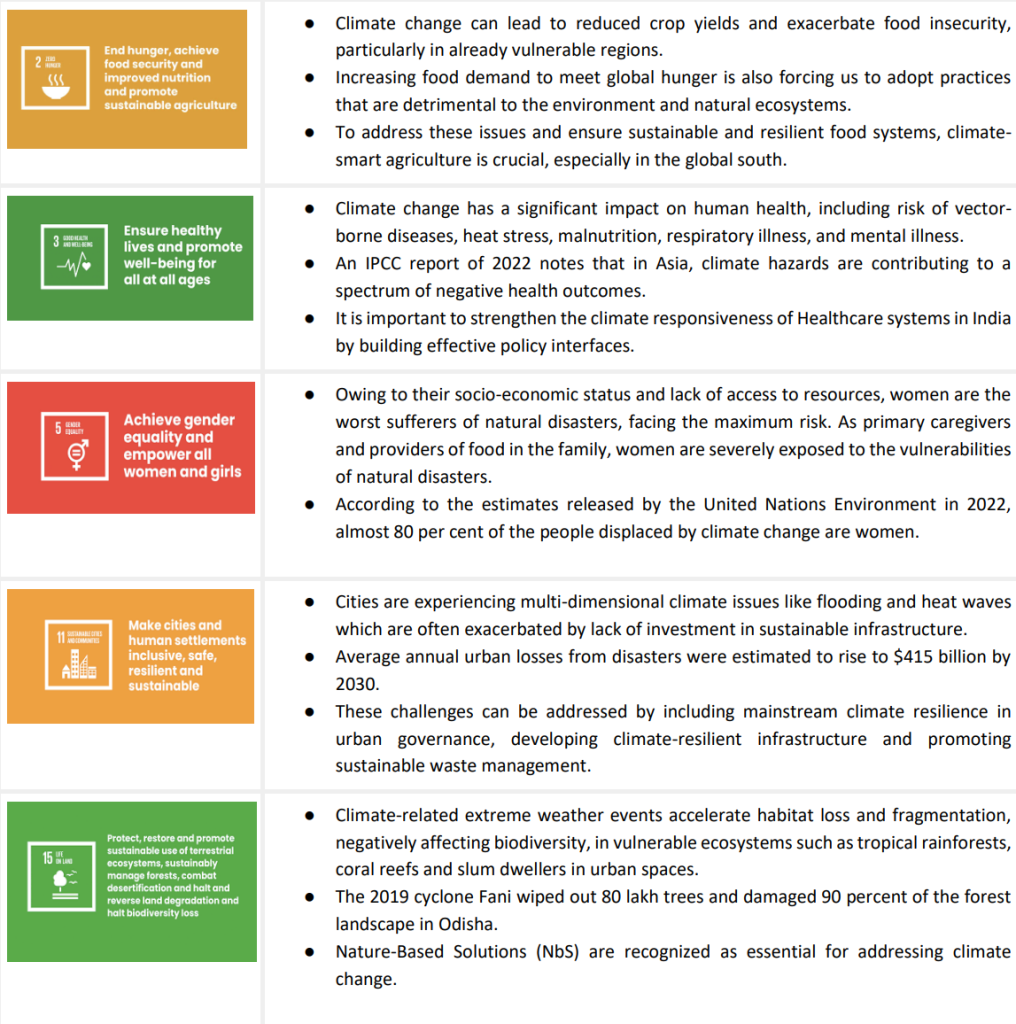The climate crisis has emerged as the perennial stressor for the global development ambitions in the forms of Sustainable Development Agenda 2030. Changing climate impacts all aspects of sustainable development, including poverty reduction, health, education, gender equality, and economic growth.
Climate is thus a deeply intersectional issue, and its impact cuts across almost all sectors and therefore requires a shift across knowledge and action. In the context of climate change and sustainable development, intersectionality recognizes that environmental problems and solutions are not isolated from other social and economic issues but are instead interconnected and interdependent.
To delve deeper into this, Dasra collaborated with the Observer Research Foundation for a research and landscape report to highlight climate change’s intersections with SDGs, with a focus on the Global South, highlighting the importance of achieving SDG 13 in achieving the other SDGs. The report employs the Drivers-Pressures-States-Impacts-Response (DPSIR) to analyze the various intersections, and how climate action largely in the form of adaptation can help in combating the problematic impacts of climate change. The drivers within the DPSIR framework are external forces stemming from societal, demographic, and economic transitions. These driving forces trigger changes in production patterns, lifestyles, and overall consumption levels. Pressures are the immediate effects resulting from the drivers. They involve the release of substances, physical and biological agents, resource utilization, and land use through human activities. The state refers to the existing condition of natural or socio-ecological systems. It encompasses both qualitative and quantitative aspects, ranging from ecosystem characteristics and natural resources to societal indicators and broader socio-economic factors. Impacts represent the outcomes of pressures on the existing state of the environment. These effects encompass changes in ecosystem functions and services, affecting various dimensions including environmental, social, and economic aspects. Responses are essentially the actions, which might evolve in the form of mitigation or adaptation processes, either in the form of a policy or a strategy.
Our collaborative report focuses on the SDGs—Zero Hunger (SDG 2), Good Health and Well-being (SDG 3), Gender Equality (SDG 5), Sustainable Cities and Communities (SDG 11), Life on Land (SDG 15), and Partnerships for Goals (SDG 17) and explores innovative interventions that address these intersections, particularly for marginalized communities. Grounded in evidence, the report suggests alignment opportunities for sustained climate action and provides short-term recommendations for the G20 presidency. These suggestions target various stakeholders, including governments, civil society,
philanthropy, and sector experts, to facilitate effective climate action.

The imperative of fostering strong global partnerships (SDG 17) to achieve the SDGs is jeopardized by climate change amid ongoing crises. Especially given India’s vulnerability to climate change and its tectonic impact on the SDGs, there is an urgent need for stakeholders to come together and build consensus on the way forward. There is a need to center the discourse on climate action around vulnerable communities and people first, and engender collaborative action by exploring pathways of building resilience in our societies and systems. All stakeholders including governments, civil society organizations, philanthropy, and communities, have the potential to scale inclusive and equitable climate action.
● Governments play a central role in creating and implementing policies that address climate change and sustainable development. The need to focus on adaptation and resilience has become increasingly urgent in the face of escalating climate change impacts. As governments worldwide grapple with the challenges posed by a changing climate, prioritizing community centric and inclusive policies will be essential to effectively address these issues.
● CSOs are uniquely positioned to be key allies in strengthening climate action in the country – with their proximity to communities, presence in intersectional sectors, understanding of local contexts, and their advocacy and mobilization skills.
● Philanthropy can provide crucial support to CSOs driving climate action by helping them in building capacity in areas that need improvement and promoting open communication for long and effective partnerships. It is estimated that India needs over US$ 1.5 trillion of climate investments between 2020 and 2030 across sectors like transport, energy, sustainable agriculture, waste management, and city resilience in order to minimize the worst impacts of climate change.
● Climate action requires all hands on deck: It is imperative for the diverse stakeholders across these sectors to come together to build consensus and chart a collaborative path towards a more sustainable and prosperous future for all. Multi-stakeholder platforms can be instrumental in enabling collaboration and consensus among the stakeholder groups and can create common opportunities to drive deeper impact by leveraging collective resources, networks, and diverse skill sets across sectors and actors affected by the climate crisis.